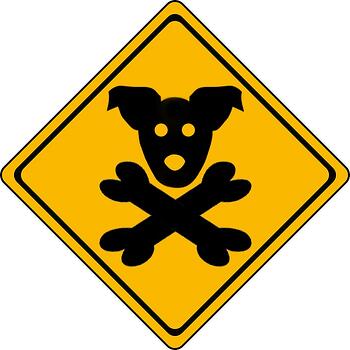The days of a huge difference between “human foods” and “dog foods” are over. We now understand that our dogs (and cats) are healthiest when they routinely eat high-quality, whole foods like we do. Many high-fat, high-salt foods are not good for dogs or cats any more than they are for humans. But some foods that are enjoyed by humans as treats are actually toxic to dogs and cats. It’s important to keep these foods in mind as holiday parties approach, gaiety ensues, and these special foods and drinks become more accessible to your pets. Be careful.

Xylitol, a.k.a. Birch Sugar
Xylitol, a.k.a. Birch Sugar – extremely toxic to dogs and possibly cats (not much data on cats, maybe because they tend to be picky eaters); found in some sugarfree candy, gum, and other sweets; maybe even some that aren’t labelled “sugar free” (peanut butter, chewable vitamins). Also in some dental products. Not toxic to humans because our systems respond to xylitol differently from those of dogs. For more information, refer to this FDA Consumer Article: “Paws off Xylitol: It’s Dangerous to Dogs”
Chocolate
Chocolate – (Theobromine and caffeine) the darker it is, the more toxic. These substances are both methylxanthines, as is theophylline (see below) so they can combine to increase the intensity of the symptoms, which are many. You may have heard of dogs who ate some chocolate and no problems were observed. A larger dog can metabolize a little chocolate, but it’s still a substance that’s toxic to dogs. Some individuals may tolerate smaller amounts, but don’t count on it, especially if it’s a smaller dog and/or dark chocolate. For more information, refer to this Pet Poison Helpline article: “Chocolate is Poisonous to Dogs”
Caffeine
Caffeine & Theophylline – in chocolate and many other foods, drinks, and household products like coffee, tea, soft drinks, the coffee beans that spilled on the floor when you were in a hurry, and even in cacao bean mulch used in gardens. These substances can cause hypertension, cardiac arrhythmia, and respiratory failure. For more information, refer to this journal article, “Household Food Items Toxic to Dogs and Cats”
Grapes, Raisin, Currants, Sultanas
Grapes and Raisins, Currants, & Sultanas – these fruits cause kidney damage in some dogs but not in others. The mechanism is not yet clear. The damage can be very serious and you can’t be sure whether your dog will be affected, but the risk is too great not to avoid it. For more information, refer to this LiveScience article: “These 7 Foods Cause the Most Pet Deaths”
Onions
Onions – contain organosulfoxides, which break down to damage the red blood cells of dogs and cats, leading to hemolytic anemia. Though some individuals may not experience this damage, hemolytic anemia must be treated and can still be fatal. Some research shows garlic may be less toxic and may be OK used in moderation. For more information, refer to this journal article, “Allium species Poisoning in Dogs and Cats”
Ethanol, Ethyl Alcohol, Liquor, & Unbaked Yeast Dough
Ethanol (alcohol) in beverages and raw bread doughs – lower doses are required for dogs and cats to become intoxicated than for humans; their bodies are smaller. Ethanol is also in many household products, even mouthwash. For more information, refer to this article from Today’s Veterinary Practice: “Ethanol Toxicosis: A Review” or this one from the Pet Poison Helpline: “Bread Dough”
Hops
Hops – used in brewing beer, can cause malignant hyperthermia – rapidly rising body temperature that can be fatal – and other symptoms when eaten by dogs or cats. It’s dangerous but treatable. For more information, refer to this article from ASPCA, “Dogs + Beer: Getting to the Bottom of Hops Toxicity”
Macadamia Nuts
Macadamia Nuts – eating a very small amount can cause symptoms of toxicity within 12 hours, though not usually fatal. The mechanism of toxicity is not yet known. Cats are assumed to also be affected. For more information, refer to this article from FirstVet: “Macadamia Nut Toxicity in Dogs”
Conclusion
Feed your dogs and cats a healthy diet of human-grade (when possible), whole, natural foods that is species-appropriate. A few treats here and there that are not the healthiest in the world won’t hurt anything – as long as they are not foods that are toxic to your pets. See our article on Feeding Your Dog for health and good behavior. Dogs and cats are of different species than you, so their systems are made differently. The foods on this list are fine for humans (in moderation in some cases) but toxic to your beloved pets, simply because of the species difference. Be aware, take care, and have a lovely holiday season.

